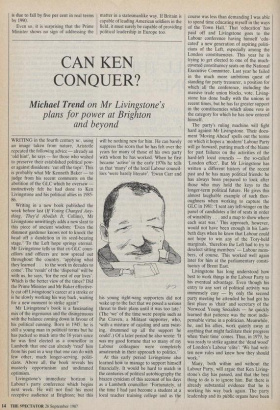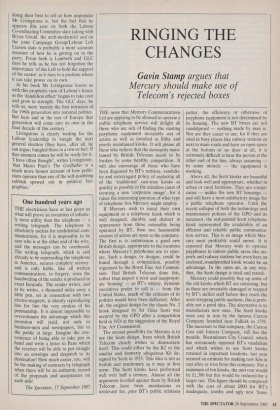CAN KEN CONQUER?
Michael Trend on Mr Livingstone's
plans for power at Brighton and beyond
WRITING in the fourth century BC, using an image taken from nature, Aristotle repeated the following advice — already an 'old hint', he says — for those who wished to preserve their established political pow- er against dissidents: 'cut off the tops'. This is probably what Mr Kenneth Baker — to judge from his recent comments on the abolition of the GLC which he oversaw instinctively felt he had done to Ken Livingstone and his political allies in 1985- 86.
Writing in a new book published the week before last (If Voting Changed Any- thing, They'd Abolish It, Collins), Mr Livingstone unwittingly adds a new slant to this piece of ancient wisdom: 'Even the dimmest gardener knows not to knock the head off a dandelion in its seed-bearing stage.' To the Left hope springs eternal. Mr Livingstone tells us that ex-GLC coun- cillors and officers are now spread out throughout the country, 'applying what they learned . . to the work in decades to come'. The 'result' of the 'dispersal' will be with us, he says, 'for the rest of our lives'. Which is the better view of the times? Did the Prime Minister and Mr Baker effective- ly cut off Livingstone's career at a stroke or is he slowly working his way back, waiting for a new moment to strike again?
Mr Livingstone's book is a fascinating mix of the ingenuous and the disingenuous with the balance coming down in favour of his political cunning. Born in 1945, he is still a young man in political terms but he has packed so much into the 16 years since he was first elected as a councillor in Lambeth that one can already 'read' him from his past in a way that one can do with few other, much longer-serving, politi- cians. Above all, the book reveals his masterly opportunism and undimmed optimism.
Livingstone's immediate horizon is Labour's party conference which begins next week. He will not find his most receptive audience at Brighton; but this will be nothing new for him. He can barely suppress the scorn that he has felt over the years for many of those of his own party with whom he has worked. When he first became 'active' in the early 1970s he tells us that 'many' of the local Labour council- lors 'were barely literate'. `Ewan Carr and his young right-wing supporters did not wake up to the fact that we posed a serious threat to their plans until it was too late.' (The 'we' of the time were people such as Pat Craven, a Militant supporter, who, 'with a mixture of cajoling and arm twist- ing, drummed up all the support he could'.) Of a later period he also wrote: 'It was my good fortune that so many of my Labour colleagues were completely amateurish in their approach to politics.'
At this early period Livingstone also learned how to manage to support himself financially. It would be hard to match in the centuries of political autobiography the brazen cynicism of this account of his days as a Lambeth councillor: 'Fortunately, at the time I had just become a student at a local teacher training college and as the course was less than demanding I was able to spend time educating myself in the ways of the Town Hall.' That 'education' has paid off and Livingstone goes to the Labour conference having himself 'edu- cated' a new generation of aspiring politi- cians of the Left, especially among the London constituencies. This year he is trying to get elected to one of the much- coveted constituency seats on the National Executive Committee. Last year he failed in the much more ambitious quest of standing for party treasurer, a position for which all the conference, including the massive trade union blocks, vote. Living- stone has done badly with the unions in recent times, but he has far greater support in the constituencies which alone vote in the category for which he has now entered himself.
The party's ruling machine, will fight hard against Mr Livingstone. Their docu- ment 'Moving Ahead' spells out the terms on which it hopes a 'modern' Labour Party will go forward, putting much of the blame for past failures on the activities of the hard-left local councils — the so-called 'London effect'. But Mr Livingstbne has written a different history of the recent past and he has many political friends: he has always been prepared to look after those who may hold the keys to the longer-term political future. He gives this almost laughable example of such thor- oughness when working to capture the GLC in 1981: 'I sent any left-winger on the panel of candidates a list of seats in order of winability . . and a map to show where each seat was.' This approach, however, would not have been enough in his Lam- beth days when he knew that Labour could not hope to win any of the Tory-held marginals, 'therefore the Left had to try to deselect sitting members' — Labour mem- bers, of course. This worked well again later for him at the parliamentary consti- tuency of Brent East.
Livingstone has long understood how best to work things in the Labour Party to his eventual advantage. Even though his entry to any sort of political activity was immensely easy — by only the second party meeting he attended he had got his first place as 'chair' and secretary of the Norwood. Young Socialists — he quickly learned that patience was the most indis- pensable virtue in a politician. Meanwhile, he, and his allies, work quietly away at anything that might facilitate their progress when 'their time' comes. Thus, in 1979, he was ready to strike against the 'dead wood' of London's Labour 'elite': 'We had writ- ten new rules and knew how they should work.'
Many, both within and without the Labour Party, will argue that Ken Living- stone's day has passed, and that the best thing to do is to ignore him. But there is already substantial evidence that he is working his way, back again. The party leadership and its public organs have been doing their best to tell us how unpopular Mr Livingstone is, but the fact that he appears this year on both the Labour Co-ordinating Committee slate (along with Bryan Gould, the arch-modernist) and on the joint Campaign Group/Labour Left Liaison slate is probably a more accurate measure of how he is getting on in the party. From both is Lambeth and GLC days he tells us he has not forgotten the importance 'of the Left to hold the support of the centre' as it rises to a position where it can take power on its own.
In his book Mr Livingstone leaves us with this prophetic view of Labour's future as the 'dandelion effect' begins to take root and grow in strength. The GLC days, he tells us, were 'merely the first intrusion of the 1960s generation into national politics. But here and in the rest of Europe that generation will come into its own in the final decade of this century.'
Livingstone is clearly waiting for the Labour leadership to bungle the next general election (they have, after all, he can argue, bungled three in a row so far). If i that moment comes he will be ready for it. `I have often thought', writes Livingstone, `that Mario Puzo's The Godfather is a much more honest account of how politi- cians operate than any of the self-justifying rubbish spewed out in political bio- graphies.'































































 Previous page
Previous page